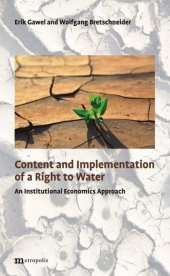 Neuerscheinungen 2016Stand: 2020-02-01 |
Schnellsuche
ISBN/Stichwort/Autor
|
Herderstraße 10
10625 Berlin
Tel.: 030 315 714 16
Fax 030 315 714 14
info@buchspektrum.de |

Wolfgang Bretschneider, Erik Gawel
(Beteiligte)
Content and Implementation of a Right to Water
An Institutional Economics Approach
2016. 112 p. 208 mm
Verlag/Jahr: METROPOLIS 2016
ISBN: 3-7316-1208-9 (3731612089)
Neue ISBN: 978-3-7316-1208-7 (9783731612087)
Preis und Lieferzeit: Bitte klicken
Especially since the recognition of the Right to Water (rtw) by the United Nations General Assembly in 2010, the rtw debate has largely been a discussion about implementation issues. Taking an institutional economics approach, the present study works on the basis that implementation deficits are not primarily due to reluctance on the part of actors in the field of water policy, but to the factual issues themselves. It focuses on two requirements: Firstly, it is also important to take seriously those sustainability objectives of water policy that may militate against strict implementation of rtw (efficiency, ecological sustainability, refinancing). Secondly, the medium under consideration, namely "water", has to be regarded as a supply service with a package of properties including not only quality, but also availability in space and time. Against this background it is evident that while there are hurdles to access for the individual user, these at the same time possess specific functions with regard to competing water policy objectives. To a certain extent, therefore, hurdles can be regarded as legitimate. From a normative point of view, the question arises as to what kind of hurdles can be regarded as legitimate, and how high these hurdles can be. We take the view that hurdles to access must satisfy the three test criteria: functionality, reasonableness of burden and non-discrimination. This leads to the new concept of "sustainable access".
In our opinion it is the task of future rtw research to explore on this foundation the limits of rights violations as closely as possible. This results in far-reaching opportunities, especially for practicable implementation of a rtw in practice. The extension of the access definition to take in the criterion of functionality, and the hurdle perspective presented here, lead to better assessment of the supply situation in practice, supply concrete approaches to improving it, include potential resistance right from the start, and thus honour the claim of the SDGs to take equal account of social and sustainability concerns.
Erik Gawel is Professor of Economics at the University of Leipzig and Deputy Head of the De-partment of Economics at the Helmholtz Centre for Environmental Research (UFZ). He studied economics and business administration at the University of Cologne, where he earned his PhD in Economics. In 2004, he qualified as a university lecturer at the University of Augsburg. He has worked at the Research Institute for Public Finance at the University of Cologne and at the Max Planck Institute for Research on Collective Goods, and served as a staff member of the Commis-sion of Inquiry into Sustainable Energy Supply set up by the German Bundestag. He was a guest research fellow at the Centre for Interdisciplinary Research at the University of Bielefeld and vis-iting professor for the German Research Foundation´s post-graduate research programme on Risk Regulation and the Civil Law System at the University of Bremen. He is the author of numer-ous scientific books and papers and also works as a publicly certified expert for the area of public sector accounting. His research interests include environmental economics, institutional econom-ics and public finance.


